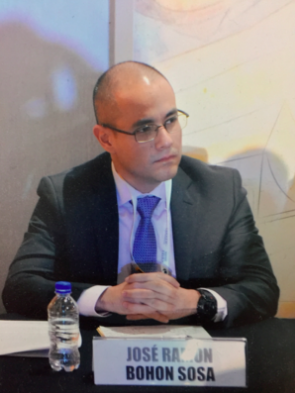Part II: Mexican Democracy: A Divergent Road
/José Ramón Bohon Sosa
Escuela Libre de Derecho de Sinaloa, Mexico
Editors’ Note: This is the second part of a two-part post concerning the Mexican elections held in early July. Part I discussed the central issue raised about the President-elect, Andrés Manuel López Obrador: whether he is a populist leader. This part examines the power that Obrador will have at his disposal to shape – possibly radically – policy and governance.
The Mexican elections were held last July 1st. Although the results were foreseeable, with Andrés Manuel López Obrador elected as president, it was difficult to predict the magnitude of his victory. Obrador won the presidency with over 50% of the votes: no second round would have been needed, had this mechanism existed in our Constitution or electoral law. Ricardo Anaya, of the right-wing party Acción Nacional (National Action Party; PAN in the Spanish acronym), received 22% of the votes. José Antonio Meade, of the Partido Revolucionario Institucional (Institutional Revolutionary Party; PRI in the Spanish acronym) - which governed Mexico for 71 years, until 2000 – reached 16%. Both parties registered the lowest votes in their respective parties’ history.
Except from Guanajuato, Obrador won the majority of the vote in every state. Congress reflects Obrador’s political party Morena as the main actor from now on, at least in the next legislature. From 500 members of Congress that comprise the lower chamber, Morena and its allies will have around 310 members, the coalition led by PAN 129 members, and the coalition that formed the historical political party of government PRI, with two other minor forces, only obtaining 61 members. In the Senate, of 128 seats, 69 will belong to Obrador’s party and allies, 39 to the PAN coalition, and 20 seats to the party of current president Enrique Peña Nieto (PRI) and allies. On the state level, 19 of 32 local legislatures will be led by Morena. By any measure, these are remarkable results for such a young political party: Morena was founded by Obrador barely four years ago.
Without room for doubt these results break new ground in political and constitutional history in Mexico. From now on, at least for the next three years, Obrador has the Mexican Constitution in his hands, with the Supreme Court the only check on his authority. As it happens, the Court will see the end of the term of Justice José Ramón Cossío in November 2018. In 2019 the same will happen with Justices Luna and Valls, and in 2021 Justice Franco will conclude his term.
So, out of 11 members of the Supreme Court, Obrador will have a decisive role in the designation of four Ministers. As the Constitution mandates, judges of the Supreme Court are appointed by the vote of two thirds of the Senate, according to a shortlist of three candidates proposed by the President. It is true that two thirds of the Senate imply 85 senators, and Obrador’s party does not reach 70 senators. However Mexico has a strong political culture of turncoats. Therefore, having in mind the unquestionable triumph, and legitimacy of the political project lead by Andrés Manuel López Obrador, it is predictable that more than a few politicians will change sides in order to survive in the current political scenario. This phenomenon could provide Obrador with enough votes to have full control over these judicial appointments.
The very same happens with the procedure of constitutional reforms, which requires the vote of two thirds of both houses, and the consent of 330 members of Congress, Morena and its allies are only 20 members short. It seems very likely that several members will eventually change sides in favour of Obrador. In order to modify the Constitution, after each initiative is approved by the Congress in said proportion, the approval of the majority of the local legislatures is also required: that would require the consent of 17 local legislatures. As indicated above, Morena will be the main political force in 19 out of 32 legislatures.
To conclude, Andrés Manuel López Obrador, as a result of his recent triumph, wields a level of power equalling (and perhaps even surpassing) the presidents of Mexico during the height of the era of the PRI, when it dominated the political system. Obrador is in practice an almost omnipotent individual that could shape his regime into not only a populist regime, but an authoritarian government with the other branches at his disposal if he so wishes.
Mexico is now at a crossroads: our democracy can evolve into a true democracy in which the people are the true beneficiaries of public institutions, or can return to the last third of the twentieth century when government was controlled by a few individuals. Paradoxically, such evolution in Mexico’s democracy depends on one man. People´s hopes are high.
José Ramón Bohon Sosa is a Professor at Escuela Libre de Derecho de Sinaloa, Mexico
Suggested citation: JR Bohon Sosa, 'Part II: Mexican Democracy: a Divergent Road' IACL-AIDC Blog (3 August 2018) https://blog-iacl-aidc.org/blog/2018/8/3/part-ii-mexican-democracy-a-divergent-road





![Xx1088_-_Seoul_city_nightscape_during_1988_Paralympics_-_3b_-_Scan [test].jpg](https://images.squarespace-cdn.com/content/v1/5af3f84a4eddec846552ea29/1527486925632-3VZP3ASLAHP1LJI0D9NJ/Xx1088_-_Seoul_city_nightscape_during_1988_Paralympics_-_3b_-_Scan+%5Btest%5D.jpg)
